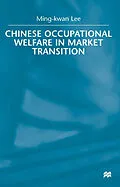Based on a case-study carried out in the southern city of Guangzhou in China, the book describes in compelling detail the dramatic changes occurring at a large state-owned enterprise as this socialist country undergoes market transition. It shows how these changes have led to the dismantling of the 'iron rice bowl', the transformation of the socialist work unit and the life of its members, and the creation of a new model of occupational welfare.
Autorentext
MING-KWAN LEE is Professor and Associate Head of the Department of Applied Social Studies and Director of the Centre for Social Policy Studies at the Hong Kong Polytechnic University. He is the author of Hong Kong Politics and Society in Transition (1987) and co-editor of several books including New Frontiers of Social Indicators Research in Chinese Societies (1996), Changing Chinese Societies: Social Indicators Analysis (1998), and Indicators of Social Development (1999).
Zusammenfassung
Starting in the 1950s, China developed a system of occupational welfare which provided comprehensive 'from cradle to grave' benefits and services to state-sector employees. Millions of these workers and their families depended on their work-units for health insurance, retirement pensions, housing, various kinds of subsidies both in cash and in kind, various collective facilities and services such as nurseries, canteens, clinics, bathing facilities, and, in large units, schools and hospitals. This book explains the origins and nature of this unique system of welfare, and, based on a detailed case-study of a large, industrial, state-owned enterprise located in the southern city of Guangzhou, describes the changes that have led to the dismantling of the `iron rice bowl', the transformation of the socialist work-unit and the life of its members, and the creation of a model of welfare pluralism with unique characteristics. These changes have important implications for citizenship rights, family solidarity and state-society relations in China today.
Inhalt
List of Tables and Figures Foreword Preface A Note on the Romanization of Chinese Abbreviations The Nature of Chinese Occupational Welfare Research Method The Origins of Chinese Occupational Welfare The Changing Contexts of Chinese Occupational Welfare Reshaping Dependence Reshaping the Danwei Welfare Economy Redistributing Risks and Responsibilities Conclusion: Towards a Chinese Model of Welfare Pluralism Notes Appendix Bibliography Index
